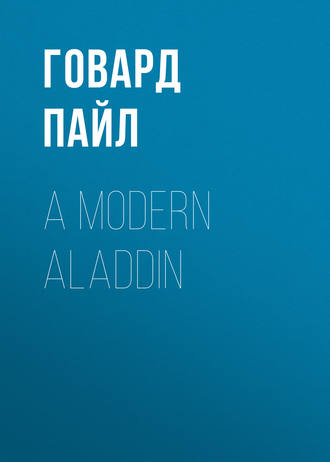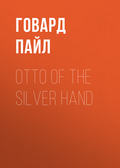
Говард Пайл
A Modern Aladdin
"What is it?" she cried. "What has happened, Oliver? Tell me."
But Oliver could not answer; he only shook his head.
Upon the landing without, Céleste suddenly stopped and laid her hand upon his arm. "Hark!" said she. "What is that?"
Oliver listened breathlessly. A dull, monotonous sobbing sounded through the house. It came from the apartment above.
"Oh, Oliver!" cried Céleste, "go and see what it is."
Oliver shook his head. "I cannot go," said he, huskily. "I am afraid. You do not know, Céleste, what an awful place this is! If you had seen what I have just beheld – "
"But you must go," said Céleste; "perhaps it is another in trouble like myself. I will wait for you here, Oliver; I am not afraid."
Oliver could not resist such an appeal; he turned, and began heavily ascending the stairs to the floor above. A door at a little distance stood ajar; it was thence that the monotonous sounds came. He advanced hesitatingly towards it, and reaching out his hand, pushed it, and it gaped slowly open upon the room beyond. Oliver only looked within for a moment, and then turned and walked stupidly away, but what he saw in that one glance was impressed upon his mind in an image never to be erased.
Tables and chairs were overturned; books lay torn and scattered upon the floor. In the middle of the room sat the woman whom he had first seen in the moonlit street at Flourens, and her pale, vacant eyes were fixed blankly upon him. Her white lips were slightly parted, but there was never a twitch upon the face that uttered those monotonous sobs that sounded dully through the silence.
Upon the floor lay stretched, bruised, battered, and bleeding, the withered, shrunken figure of an aged man, his limbs a mass of dried skin and bones. The yellow, parchment-like skin was stretched over his head and his face so tightly that it seemed as though it would crack. The shadow of death brooded upon him as he gazed with filmy, sightless eyes into the dark hollow of eternity that lay beyond. His breast, for a long time motionless, now and then heaved convulsively with the laboring breath. Such was the vision that Oliver saw in that one glance. Then he turned and walked away.
"Who was it, Oliver?" said Céleste.
Oliver answered never a word, but taking her by the hand, led her forcibly down the stairs and out of the house.
EPILOGUE
There was a seven days' gossip in Paris. All manner of rumors were afloat, for strange things had happened at the Hôtel de Flourens. The marquis had had a sudden stroke of apoplexy upon the very day of his daughter's wedding. But when they had called the family, she and that handsome young husband of hers were nowhere to be found. They had left the hôtel, and did not return again until long after nightfall. Where they had been was a profound secret which they kept locked within their own breasts. But the poor marquis, he was dying. He had never once spoken since he had fallen under the attack. Dr. Raymond-Brasse, and the other physicians who attended him, said that it would be little less than a miracle if he lasted until Wednesday.
Presently other rumors began to get abroad. That vast, fabulous wealth of the interesting Count de Monnière-Croix had vanished; not a crumb of it was left. The debt had been paid off, both upon the château and upon the hôtel, but that was all. It was almost inconceivable that the marquis had squandered that stupendous fortune away in three months, but how else could the matter be explained? It was all very strange and mysterious.
Another thing agitated the world. The Count de St. Germaine had vanished! He had gone! It was rumored that the Prince of Hesse-Cassel had sent for him, and that he had departed. Certainly the Paris world saw him no more.
AFTER THE PLAY
Ting! A-ling! A-ling! Bring down the curtain, the extravaganza is ended. The red and blue flames are quenched, the pasteboard scenery is pushed back against the wall, the mock jewelry is tumbled into the bandbox, and all the characters have gone into their dressing-rooms to wash the paint off their faces. The lights are out, and nothing is left.
But what does it mean? Who was Monsieur de St. Germaine? Who was Gaspard? Who was the old man who died just now? And that mysterious woman, was she the better life of Nicholas Jovus, which he had materialized along with the evil life? Was it possible that he could not materialize the one without the other? Does it all mean —
"My good friend, why do you ask me? You have seen just as much of this extravaganza as I."







